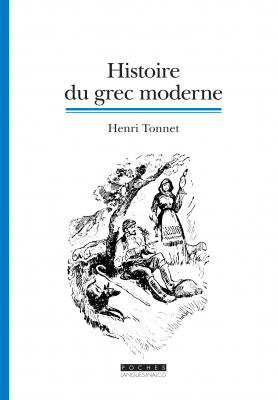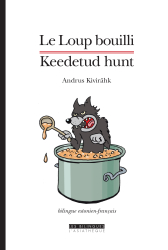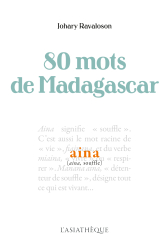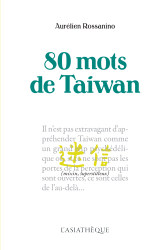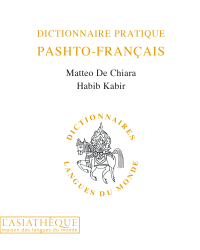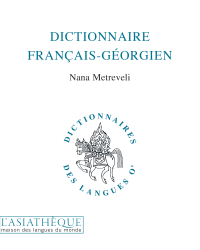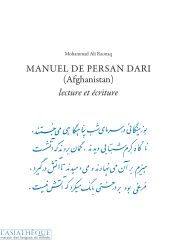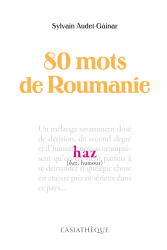Details
Format: Paperback
ISBN: 9782360570140
Collection: Hors Collection
12.5 x 18 cm
Weight: 283 gr
Pages: 296
Edition :
2011
First publication: 01/01/1993
Last printing: 05-2023
CLIL: 4033
BISAC: LAN009000
Histoire du grec moderne
La formation d'une langue
Through texts and commentaries, Henri Tonnet outlines and explains the evolutionary stages through which the Greek language has developed from ancient Greek to modern Greek. Henri Tonnet is an emeritus professor in modern Greek language and literature (Paris IV – Sorbonne University).
CONTRIBUTORS' BIOGRAPHIES
Henri Tonnet
Henri Tonnet, professor emeritus at the Sorbonne, headed the study center Balkan Studies of Inalco and the Neo-Hellenic Institute of the Sorbonne. Creator, with Guy Saunier, of the Revue des études néo-helleniques, he was editor in chief of the Cahiers balkaniques.
TABLE OF CONTENTS
Préface de la deuxième édition
Introduction
1. Évolution de l'espace où l'on a parlé
1.1. Le grec en Occident (Greek in the West)
1.2 . Le grec en Orient (Greek in the East)
2. Problèmes théoriques (Theoretical issues)
3. Principes critiques (Critical principles)
Chapitre I
Petite histoire de l'écriture grecque (A short history of the Greek alphabet)
1. Introduction
2. Le linéaire B (Linear B)
3. Les lettres "phéniciennes" (Phoenician Letters)
4. Écriture du grec ancien et médiéval (Ancient and Medieval Greek Writing)
Chapitre II
Le grec ancien (Ancient Greek)
1. Le grec commun (Everyday Greek)
1.1. Faiblesse des consonnes (Weak consonants)
1.2. Conservation du système vocalique (Preservation of the vowel system)
1.3. Tendance limitée à la régularisation des racines verbales (The limited tendency to regularise verbal roots)
1.4. Simplification relative du système de l'accentuation (The relative simplification of the system of accentuation)
1.5. Simplification de la déclinaison (The simplification of declension)
2. Les dialectes grecs anciens (Dialects of Ancient Greek)
Chapitre III
La koiné
1. Sa formation (Formation)
2. Étapes de l'évolution de la koiné alexandrine (Stages of evolution of Alexandrian Koine)
2.1. Période macédonienne et romaine (The Roman and Macedonian Periods)
2.2. Période mal documentée (VIIe-XIe siècle) (The ill-documented years)
2.3. Période du grec médiéval (XIIe siècle - 1453) (The Medieval Greek period)
2.4. L'occupation turque (1453-1830) (Turkish Occupation)
3. L'époque romaine (The Roman Era)
3.1. De la koiné alexandrine à la koiné romaine (From Alexandrian Koine to Roman Koine)
3.2. Les sources de notre connaissance de la koiné d'époque romaine (The sources of our knowledge about the Koine of the Roman Era)
3.2.1. Les dictionnaires atticistes des IIe et IIIe siècles (Atticist dictionaries of the 2nd and 3rd centuries)
3.2.2. Les Évangiles (The Gospels)
4. Caractères généraux de la koiné d'époque romaine (General characters of the Koine of the Roman Era)
4.1. Disparition de l'aspiration initiale (The disappearance of the initial aspiration)
4.2. Destruction du système des quantités et des accents musicaux (The disappearance of systems of quantity and musical accents)
4.3. Nouvelles prononciations des voyelles et des consonnes (New pronunciation of vowels and consonants)
4.4. Morphologie (Morphology)
4.4.1.Le datif (The dative)
4.4.2. Recul de la troisième déclinaison (The decline of the third declension)
4.4.3. La première et la deuxième déclinaisons (The first and second declensions)
4.4.4. Modes et temps du verbe (Moods and verb tenses)
4.4.5. Les formes du verbe (Forms of verbs)
4.5. Syntaxe (Syntax)
4.6. Renouvellement du lexique (Renewal of the lexicon)
5. La koiné des deux premiers siècles (Koine of the first two centuries)
5.1. Extrait de l'Évangile (Marc 6, 22-29) (Extract from the Gospel - Mark 6, 22-29)
5.2. Pap. Fayum 114 (100 apr. J.-C.)
5.3. Pap. BGU 846 (IIe siècle apr. J.-C.)
6. La koiné tardive (VIe et VIIe siècles) (Later Koine - 6th and 7th Centuries)
P. Oxy. (1874)
Chapitre IV
La période mal documentée du VIe au XIe siècle (The ill-documented period, from the 6th to the 9th century)
1. Vocabulaire (Vocabulary)
2. Morphologie (Morphology)
2.1. Le substantif (Substantives)
2.2. Le verbe (Verbs)
3. Syntaxe (Syntax)
Chapitre V
La langue médiévale (du XIIe au XVe siècle) (The Medieval Language; from the 12th to the 15th century)
1. Le poème de Michel Glykas (1159) (The 1159 poem of Michel Glykas)
2. Poèmes ptochoprodromiques (milieu du XIIe siècle) (Ptochopromidic poems in the middle of the 12th Century)
3. Chronique de Morée (première moitié du XIVe siècle) (The Chronicle of Moreos in the first half of the 14th Century)
Chapitre VI
Le grec sous l'occupation ottomane (du XVe au début du XVIIIe siècle) (Greek under Ottoman occupation, from the 15th century to the beginning of the 18th century)
1. Du XVe siècle au siècle des Lumières (From the 15th century to the Age of Enlightenment)
2. Apocopos de Bergadis (première moitié du XVe siècle) (Acpocopos of Bergadis, in the first half of the 15th century)
3. Le Pentateuque de Constantinople (1547) (The Pentateuch of Constantinople)
4. La première Grammaire du grec vulgaire et l'oeuvre de Sofianos (The first grammar book of common Greek and the work of Sofianos)
5. Deux échantillons du grec du XVIIe siècle (Two samples of 17th century Greek)
5.1. Erotocritos (première décennie du XVIIe siècle) (Erotocritos, first decade of the 17th century)
5.2. Les travaux des champs d'Agapios Landos (1643) ('Field work' by Agapios Landos)
Chapitre VII
Les origines de la question de la langue – Du XVIIIe siècle à 1821 (Origins of the question of language, from the 18th century to 1821)
1. Introduction
2. Le problème lexical (Lexical issues)
3. Le problème des dialectes (The issue of dialect)
• Les Korakistiques de Rizos Néroulos (1813)
3.1. Les emprunts linguistiques (Linguistic derivations)
3.2. Les prononciations dialectales (Dialectic pronunciation)
3.3. Syntaxe et vocabulaire dialectaux (Dialectic syntax and vocabulary)
4. Premiers essais de régularisation de la langue parlée (First attempts at regulating spoken language)
4.1. Un réformateur respectueux de la langue : Katardzis (A conscientious reformer of the language: Katardzis)
4.1.1. Les emprunts (Derivations)
4.1.2. La régularisation de la langue (Regulation of the language)
4.1.3. Conclusion
4.2. Un réformateur idéologue: Coray (An ideological reformer: Coray)
• Lettre à Alexandre Vasiliou (1804)
4.2.1. La phonétique (Phonetics)
4.2.2. La morphologie (Morphology)
4.2.3. La réforme du vocabulaire (Vocabulary reform)
4.3. Conclusion sur les premiers réformateurs de la langue (Concluding note on the first reformers of the languages)
Conclusion
Index des mots grecs (Index of Greek words)
Index des termes linguistiques et grammaticaux (Index of grammatical and linguistic terms)
Table des matières (Table of contents)
